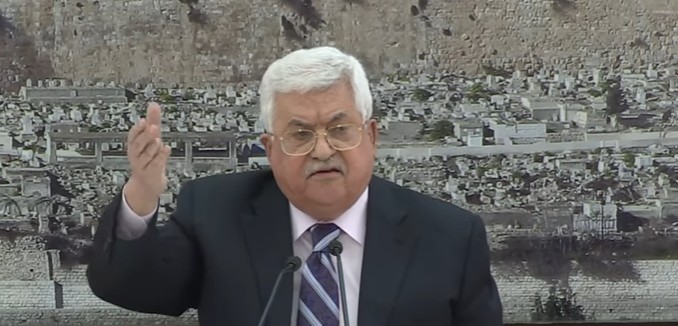Last month, the United States enacted the Taylor Force Act, which will deduct the amount the Palestinian Authority (PA) pays to terrorists and their families from the amount of U.S. financial aid to the PA. Within days, the PA passed a new budget that allocated millions to pay terrorists and their families.
The PA’s response to the passage of the Taylor Force Act is emblematic of an ongoing dynamic. The U.S. calls for an end to Palestinian support for violence and the PA then refuses to comply.
In 2002, the Israeli navy intercepted the Karine-A, a weapons-laden ship, in the Red Sea on its way to the PA from Iran. The capture of the ship and the intelligence gleaned from it by Israel forced the U.S. to go “from viewing Arafat as an eccentric but necessary peace proponent, to viewing him as the heart of the terror problem.”
In a speech given a few months later, then-President George W. Bush called on the Palestinians to elect “leaders not compromised by terror.”
“Today, Palestinian authorities are encouraging, not opposing, terrorism. This is unacceptable. And the United States will not support the establishment of a Palestinian state until its leaders engage in a sustained fight against the terrorists and dismantle their infrastructure,” Bush said.
Later he added, “To be counted on the side of peace, nations must act. Every leader actually committed to peace will end incitement to violence in official media, and publicly denounce homicide bombings.” And he called on leaders committed to “stop the flow of money” to terrorists.
The U.S. reaction to the Karine A incident led to the sidelining of Yasser Arafat as the Palestinian leader and his replacement by Mahmoud Abbas, who was elected to a four-year term as president in January 2005.
While Abbas hasn’t been implicated in directing terror against Israel the way Arafat has, his record as PA president has shown that he has continued incitement to violence and has ensured that his government has continued the flow of money to terrorists as incentives.
Two years ago, when U.S. Army veteran Taylor Force was stabbed to death in Israel, then U.S. Vice President Joe Biden, in a rebuke to Abbas, said that the U.S. “condemns these acts and condemns the failure to condemn these acts.” Even after meeting Biden, Abbas refused to condemn the terror attack. Abbas’s refusal to accede to Biden’s demand came in the wake of an official social media post by Fatah, the political party headed by Abbas, that called Force’s murderer a “heroic martyr.”
Following his inauguration as president, Donald Trump has been very vocal in demanding that Abbas and the PA stop encouraging terror.
In May of last year, Trump met with Abbas twice and directly conveyed this message to him.
Trump told Abbas that “no lasting peace” can be achieved between Israel and the Palestinians “unless the Palestinian leaders speak in a unified voice against incitement to violence.” And a few weeks later, when they met in Bethlehem, Trump said during a joint appearance, “Peace can never take root in an environment where violence is tolerated, funded and even rewarded.”
The Trump administration has taken notice.
In a conference call organized by The Israel Project this past September, former deputy national security advisor Elliott Abrams said that Abbas’s rhetoric during last summer’s riots over the Temple Mount inflamed, rather than calmed the crisis, and that his behavior “really changed their [the Trump administration’s] opinion of him.”
The budgeting of millions to pay terrorists and their families continues a practice that incentivizes terror. Coming at a time when the U.S., with bipartisan legislation, had just signaled that it would not tolerate the encouragement of terror, Abbas’s and the PA’s defiance is astounding.
The U.S. is insisting that Abbas and his government live peaceably with Israel, which should be a minimum requirement for coexistence. And yet Abbas continues to say “no,” to this reasonable demand.
If there’s no Palestinian-Israeli peace, Abbas’s refusal to stop encouraging and incentivizing terror is a primary reason for that.
[Photo: AFP / YouTube ]




